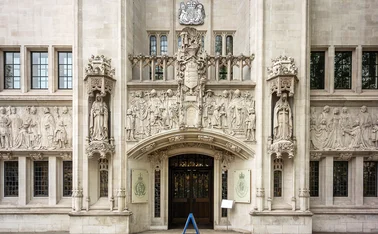
Post Europe: International teamwork, the key to tackling piracy

Piracy has been an evolving threat for ship owners and the marine insurance market since the 1980s and Neil Smith argues that international cooperation is the only way to combat the modern scourge of marine piracy.
Oberamerggau, in the Bavarian district of Garmisch-Partenkirchen in southern Germany is known to most people as the home of the Passion Play, a performance put on by the village inhabitants as a decennial thank you to God for sparing them from the full horror of the Bubonic plague, which was still rife in 17th century Europe. Fast forward 400 years and, while there is thankfully no plague to deal with, Oberamerggau is today playing its part in helping to rid the world of another persistent scourge that shows no sign of disappearing: marine piracy.
Home to the North Atlantic Treaty Organization school, which serves as a centre for individual education and training for military and civilian personnel, Oberamerggau saw its first ever Nato anti-piracy workshop during February. The objective was to provide commanders as well as legal advisors with a broad knowledge of piracy issues from the historical, commercial and Nato perspectives.
Joint intelligence
The event also looked at lessons learned from past and current Nato anti-piracy operations as well as the topic of Nato-European Union co-operation in anti-piracy activities. It is undoubtedly this type of joint intelligence sharing that will ultimately pay dividends when it comes to fighting piracy.
It may well be that some form of piracy was around long before the plague made its mark on Europe, with some records suggesting that incidents around the Aegean and Mediterranean seas were taking place as long ago as the 13th century BC. Modern day piracy, however, looks very different and tends to erupt in ‘failed state' areas where it can thrive unchecked.
In the 1990s, the International Marine Bureau Piracy Reporting Centre found that piracy attacks averaged 160 per year and tended to focus around the Malacca Straits, a major trade route between the Malay Peninsula and the Indonesian island of Sumatra.
"A persistent scourge that shows no sign of disappearing: marine piracy."
Low tech piracy
The pirates, travelling in small, high-powered craft, would typically target small coastal craft, looking for items that could be readily sold on for cash, such as mobile phones, laptop computers or crew wages. The pirates would board the vessel, tie up the crew, ransack the stores and crew quarters for relevant items, and then disembark. In this way, losses were relatively low and, with few injuries, the vessel could continue on its way relatively unscathed.
The taking of the Saudi-owned super tanker Sirius Star in 2008, however, dramatically illustrated not only how the geography of pirate attacks had shifted from Asian waters, such as the Malacca Straits, to the Somali coast and the Gulf of Aden, but also how pirates had begun to regard the crew, not the cargo, as the valuable prize. At the time of writing there are currently 28 vessels and 587 crew members being held hostage by Somali pirates and, in stark contrast to the 1990s, around 640 vessels have been attacked since 2008. Of these, 159 have been successfully hijacked with typical ransom demands for several million pounds.
Changing insurance picture
In response to both the increased frequency of piracy attacks and their particular modus operandi, the insurance world has had to adapt as well as introduce new covers to help shipping companies manage the risk.
In the early part of the 21st century, the increased sophistication of the pirates led the marine hull market to reconsider the way in which it provided piracy coverage. Merchant ships were being approached by small vessels, the crews of which would be waving assorted weaponry, including AK47s and rocket-propelled grenade launchers. Were these people pirates or terrorists? How could the crew tell?
"Pirates had begun to regard the crew, not the cargo, as the valuable prize."
Fundamental issue
This may appear an academic question, but from an insurance perspective it is a fundamental issue. Piracy cover in London was provided by the marine hull insurers, while terrorism was a coverage that fell under war policy. Two separate heads of cover, often written by different insurers.
In the event an incident escalated there was potential for the two different sets of insurers to become involved in a legal wrangle over where cover would fall. In these circumstances, the only loser would be the ship owner because the claim couldn't be settled until the question of cover had been resolved. To address this problem, the London market produced a bouquet of clauses in 2005 that gave insurers the ability to move cover from the hull policy over into the war policy, thus removing the element of uncertainty and making the method of attack more the issue rather than the motive.
Bespoke solutions
In addition, insurers have responded more recently to the changed threat with bespoke marine kidnap & ransom policies to protect the crew, and cover to protect a shipping company from loss of earnings while its ship and crew are being held.
Insurance can adapt but ultimately it needs all parties to work closely together to reduce the incidence of piracy. In the1990s, for example, the concerns regarding the Malacca Straits led the Joint War Committee, made up of marine hull insurance underwriters from the Lloyd's and London markets, to add the Straits to its listed areas. This step, alongside pressure from the maritime community to address the shortcomings around Malacca, meant that the governments in Indonesia, Malaysia and Singapore worked together to co-ordinate anti-piracy activity thus reducing the level of incidents down to a more manageable level.
"The only loser would be the ship owner because the claim couldn't be settled until the question of cover had been resolved."
Essential discussions
There is unlikely to be a long-term solution to piracy in areas such as Somalia until political stability returns, which means sharing the best in risk management advice and discussing measures such as armed guards, safe rooms and crew preparation and training are absolutely vital.
It will take concerted and coordinated action from ship owners, international navies, including those forces coordinated by Nato, the EU and the US, as well as its ancillary services, including marine insurers, to mitigate the impact of piracy. It is why events such as the anti-piracy workshop at Oberamerggau are to be welcomed.
Neil Smith is the head of underwriting at the Lloyd's Market Association
Only users who have a paid subscription or are part of a corporate subscription are able to print or copy content.
To access these options, along with all other subscription benefits, please contact info@postonline.co.uk or view our subscription options here: http://subscriptions.postonline.co.uk/subscribe
You are currently unable to print this content. Please contact info@postonline.co.uk to find out more.
You are currently unable to copy this content. Please contact info@postonline.co.uk to find out more.
Copyright Infopro Digital Limited. All rights reserved.
As outlined in our terms and conditions, https://www.infopro-digital.com/terms-and-conditions/subscriptions/ (point 2.4), printing is limited to a single copy.
If you would like to purchase additional rights please email info@postonline.co.uk
Copyright Infopro Digital Limited. All rights reserved.
You may share this content using our article tools. As outlined in our terms and conditions, https://www.infopro-digital.com/terms-and-conditions/subscriptions/ (clause 2.4), an Authorised User may only make one copy of the materials for their own personal use. You must also comply with the restrictions in clause 2.5.
If you would like to purchase additional rights please email info@postonline.co.uk








